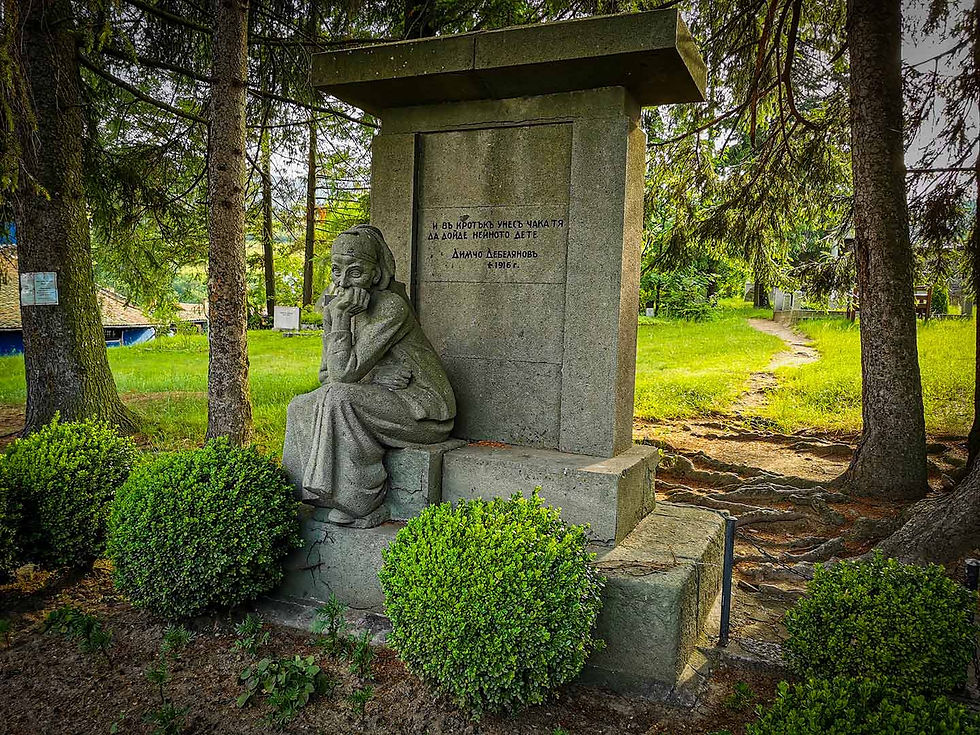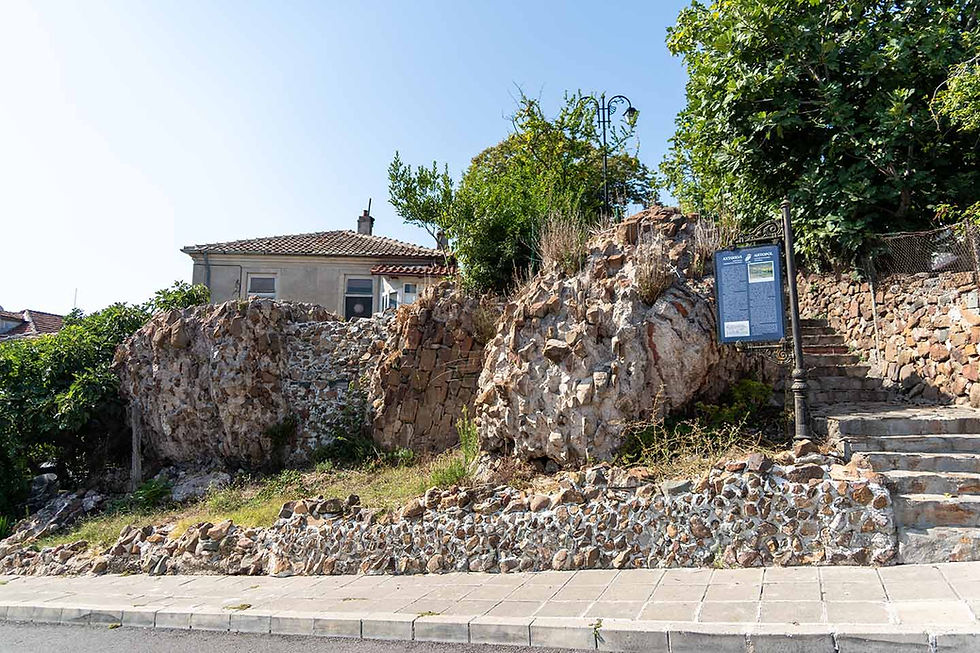Dimcho (Dincho) Debelyanov
- Stefan Ivanov

- Mar 16, 2023
- 5 min read
Updated: Jan 20, 2025
Dear friends of "Photo moments", 2023 marks the 136th anniversary of the birth of one of the most sensual, most elegant and most beloved representatives among Bulgarian poets - Dimcho Debelyanov.

He was born on March 28, 1887 in Koprivshtitsa.
The youngest child out of a total of six.
His father is the abbot Velyo Debelyanov, and his mother's name is Tsana Ilieva Staychina.
He was named Dincho - after his grandfather Dincho Debelyan.
Later he tells that one day when he stood on a high meadow above the city and called out his name loudly, the echo answered him:
Dimcho,
Dimcho,
Dimcho...
and so he decided to cross himself.
Dimcho is a bright soul – modest, quiet and shy.
He is gifted with a Spirit that seeks the beauty around.

This is the poet's native house.
It was built in 1830 and today it has been turned into a museum.
The museum exposition tells in a unique and wonderful way about the life and literary activity of the poet.

Dimcho lost his father when he was only nine years old.
His family moved to Plovdiv with the eldest son - Ivan.
Dimcho studied at the "Yellow School" and then at the Plovdiv Boys' High School.
Growing up in a small, quiet, green Sub-Balkan town, the noise of Plovdiv got to him more.
It is here that he takes his first timid steps, writing lyrics, but unfortunately they do not reach us, because he is too insecure and burns them all.
In the fall of 1904, his family moved again – this time to Sofia, where he rented accommodation at 46 Oborishte Street.
In 1906, Dimcho graduated from the 1st Men's High School.
At that bohemian time, the Bulgarian cultural and literary intelligentsia was concentrated in the capital, the meeting with which inevitably predetermined the creative path of the main character of our story, and from that moment on, his fate remained forever connected to the arrangement of rhymes.
In the period 1906 - 1907, his poems appeared on the pages of the magazines "Bulgarian Collection" and "Sovremenost".
Friends with Mitko Podvrazachov and Niki Liliev. It is this strong friendship that strengthens his successive lyrical revelations.
After completing secondary education, Dimcho started working as a day laborer at the Metrological Station.
But Dimcho is a creator! A dreamer! Seek beauty! And he did not stay in this position for long.
He became a reporter and proofreader for the newspapers "Balkanska tribuna" and "Den".
For a while he was even a stenographer in the National Assembly.
In the Sofia Municipality, he translates from Russian and French languages.
Create and arrange rhymes constantly! And success is not late, because he searches fervently and makes his way in life.
In 1910, together with Dimitar Podvrazachov, he published the first Bulgarian poetry anthology "Bulgarian Anthology. Our Poetry from Vazov onwards".
After 1910, he created his most subdued and serious masterpieces.
In the capital, the gentle Dimchova soul soars through the native green fields of Koprivshten and searches for bright childhood memories!
That is why in 1912 he wrote "To return to the father's house".
Romance is not too late either - he meets the teacher Maria (Mara) Vasileva - Bell and Dimcho is full of love!
But Mara fell ill with tuberculosis and soon left this world.
And Dimcho remains devastated.
At the same time, he is co-editor with Dimitar Podvrzachev in the magazine "Zveno", where Yordan Yovkov and Geo Milev publish.
The Balkan War is coming and Dimcho is mobilized.
He served as a private in Samokov.
The following year he was transferred to the School for reserve officers in Kniazhevo, and two years later he was promoted to the rank of second lieutenant.
Just before the beginning of the First World War, Dimcho was briefly in Koprivshtitsa and caught a last glimpse of his native home and territory. Then he left as a volunteer on the Southern Front.
A few days before his death, Dimcho had to go on leave, but someone else left in his place.
In the last hours before the fatal shot, Dimcho's soul poured out its "Orphan Song".
It was the morning of October 2, 1916.
On the left bank of the Struma River, between Seres and Demir Hisar, Dimcho Debelyanov was the commander of the 5th company, which was in battle with Anglo-French military units near Gorno Karadjovo (today Monoklisia).
Tihomir Gerov, a witness to the last moments of the poet, recalls:
Suddenly, as he stood upright, he threw up his arms, spun round, dropped the revolver and spade, and fell to the ground, clutching his wound with his hand.
He tried to unbutton his garment but couldn't…
The next day, Dimcho Debelyanov was buried in the cemetery of the Demirhisar church "Blagoveshtenie" or Valovishta, today Sidirokastro.
He leaves at 29 years old.
For honors and merits during the second period of the war, he was posthumously awarded the Military Order "For Courage", IV degree.
Four long years pass.
One day, while cleaning the overcoat of her husband - Lieutenant Toma Tomov, his wife found two small pieces of poetry hidden in the cuff of the coat.
Only then did the officer remember that on the morning before the battle on October 2, 1916, Dimcho Debelyanov gave him his last poems.
The poet's vow is that if he dies in battle, his commander Toma Tomov will hand over the notes to Dimitar Podvrzachev.
The story of the two poems came to light only in 2010, when the grandson of Svetoslav Minkov, Svetoslav Tanev, told it to the literary historian Rumyana Pencheva, head of the "Funds and Literary Heritage" department at the National Literary Museum.
In 1931, on the initiative of "Living Word" and Dimitar Podvarzachov, the mortal remains of Dimcho Debelyanov were transferred from the Bulgarian church in Demir Hisar to his native Koprivshtitsa - in the courtyard of the Assumption Church.
In 1934, the sculptor Ivan Lazarov was invited to make a monument to the poet.
During one of his visits to Koprivshtitsa, he saw grandmother Lila Paraleeva (who had lost her husband and son in the wars) sitting on the threshold of her gate - resting her head on her hand and lost in thought.
This gives him the idea for the monument.
Since Lila Paraleeva died soon after, the sculptor used grandmother Lala Dushkova as a model.
The sculptor sculpts the touching figure of the mother sitting on the threshold, staring at the road.

The original of "Mother" is today in the yard of the poet's house-museum in his native Koprivshtitsa.

Until new poems, friends!




Comments